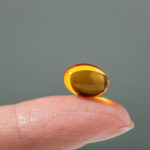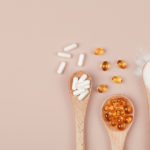By Bonnie Jenkins, Advanced Natural Wellness
As wonderful as the holidays can be, many of us tend to burn the candle at both ends during this time of year. Adding insult to injury, the holiday season often finds us eating less than healthy meals and shortchanging ourselves in the sleep department. So it isn’t any surprise that our immunity can suffer during the holidays, setting us up for a cold, the flu or something much more serious.
Luckily, taking the right supplements can help bolster your immune system and keep you healthy throughout the New Year.
Vital Vitamins
The reason health advocates place so much importance on a good diet is because eating a wide variety of foods provides the vitamins essential to a healthy immune system. Unfortunately, most of us don’t eat this ideal diet – and that’s especially true during the holidays. But here’s a cheat sheet of the vitamins you need most: The B vitamins are critical to cell reproduction, including cells involved in the body’s defenses. Even borderline deficiencies of vitamins B6, B12 and folic acid can wreak havoc with immune function. Seniors are especially vulnerable because they are more likely to be deficient in these particular vitamins. Vitamin C is an important component of a healthy immune defense. While the jury is still out on this nutrient’s ability to cure the common cold, taking 2,000 mg. of vitamin C daily can help keep your immune system strong. Not getting enough vitamin E can also derail the immune system. The amount of E for optimal immunity may be as high as 800 IU. This amount has been shown to restore age-related declines in immune function. Of course, there are some nutrients – most notably vitamin A – that you shouldn’t take large amounts of. Vitamin A is essential for a healthy immune system, but too much of the retinol form of A is detrimental to immunity, bones and liver. Look for a multi that provides no more than 100 percent of the Daily Value (DV) for vitamin A, with at least 20 percent of this as beta-carotene.
MD Exposes the Hidden Danger to Your Eyes

When your eyesight starts to fail, it's a real problem. Suddenly you can't go to the grocery store... you can't get to the doctor if you have an emergency... you can't meet your friends for dinner…
Your "regular" doctor doesn't have time to keep up with the latest research. And the same goes for eye doctors. They go to school to learn how to fit you for glasses and contacts, but have no way of preventing the damage and loss of eyesight that threatens your freedom and independence.
Let me show you something that explains a LOT about how your eyes work.
In my FREE Special Report, I'll show you a HUGE, untapped resource for your eyes that safely and naturally restores clear, effortless eyesight.
Click here to get started...
Mind Your Minerals
A truly robust immune system requires more than just vitamins. Several minerals also play a key role in fending off disease.
Zinc is crucial for normal immune cell development and growth. Particularly vulnerable to a zinc deficiency are cells that replenish rapidly, like those in the skin and in the lining of the gastrointestinal and respiratory tracts. Even a borderline zinc deficiency can leave you vulnerable to attack by opportunistic infections. But don’t take more than 15 mg. daily since too much actually impairs immunity.
Copper deficiency can reduce acquired immunity – and if you’re taking supplemental zinc, it’s important to also take supplemental copper, since zinc can inhibit copper’s absorption. When under attack, a copper deficiency can interfere with the body’s ability to produce T cells, B cells and antibodies. These are immune-specific cells that help trigger events that kill off invaders. A copper deficiency also causes a decline in white blood cells that ingest invaders. Prevent this by taking 2 mg. of supplemental copper each day.
Selenium also aids immune function. Plus this trace mineral enhances the antioxidant effect of vitamin E. Not only will selenium bolster your defenses against colds and flu, there is some evidence that it can also help protect against cancer. But like the other immune-boosting minerals, a little goes a long way. A daily dose of 100 to 200 mcg. of selenium is plenty – and taking excessive amounts can even be toxic.
One Last Thing …
The World's Quickest Solution for Ending Prostate and Urinary Misery
This has recently been revealed to be one of the only real breakthroughs in prostate health.
The seeds of a strange fruit (sometimes called "Chinese Apples") hold powerful phytonutrients that are a revolution in prostate health.
In fact, UCLA and Veterans Administration research have now proved this to be true.
Not only that, but it may be the worlds quickest solution for ending prostate misery.
Simply stated, these phytonutrients represent a huge step beyond beta sitosterol, saw palmetto, and other phytosterols alone.
Simply click HERE if you want to have fast prostate relief...restful, uninterrupted sleep...no more constant "urges to go"...enhanced virility...and optimal prostate support for life.
Most of us know that high cholesterol is bad for your heart. But did you know that it can also impair your immunity? Researchers at the Human Nutrition Research Center on Aging at Tufts University in Boston compared the immune function in people eating a high-fat diet versus a low-fat diet. The low-fat diet enhanced T-cell-mediated immunity in older people with elevated LDL-cholesterol levels.
Skimping on the right fats can be just as harmful. Your body needs alpha-linolenic acid, an essential omega-3 fatty acid found in flaxseed, walnuts and canola oil, and a precursor to the more potent omega-3 fatty acids in fish. Also essential is linoleic acid – an omega-6 fatty acid in vegetable oils, nuts and seeds. Just make sure you are getting the right balance of these good fats. Try to consume a ratio of at least one part omega-3 to no more than four parts omega-6 fatty acids.
Research Brief …
As strains of Johnny Mathis crooning about chestnuts roasting on an open fire fill the kitchen, I am reminded of how much I love these seasonal nuts. Low in both fat and calories compared to other nuts, chestnuts offer up a unique nutritional profile. In fact, these creamy nuts are a good source of vitamin B6 and fiber. They also provide a variety of trace minerals, including calcium, iron, magnesium, phosphorous, manganese, copper, selenium and zinc. What’s more, chestnuts are an especially rich source of potassium, ranging from 119 mg. to 715 mg. for 3.5 ounces – good news for folks with high blood pressure.
According to Norwegian researchers, chestnuts are also filled with heart-healthy antioxidants. In fact, chestnuts are the only nuts that contain vitamin C. One ounce of boiled chestnuts delivers between 9.5 mg and 26.7 mg of the vitamin, while the dried variety have double the vitamin content, totaling 15.1 mg to 61.3 mg for 3.5 ounces.
So enjoy this nutty treat this holiday season. Personally, I can’t think of a more delicious way to get these essential vitamins and minerals.
And, speaking of the holidays – whether you are celebrating Christmas, Hanukkah or Kwanza, I wish you lots of love and laughter. May you find that all of life’s gifts are greater than what you expected. I also wish you health in both body and mind. Blessings from all of us at Advanced Natural Wellness!
References:
Blomhoff R, Carlsen MH, Andersen LF, et al. “Health benefits of nuts: potential role of antioxidants.” British Journal of Nutrition. 2006;96 Suppl 2:S52-60.
Ciocoiu M, Badescu MM, Lupusoru EC. “The intervention of antioxidant therapy on platelet adhesion and immunomodulation in experimental physical stress.” Free Radical Research. 2007;41:829-838.
Han SN, Leka LS, Lichtenstein AH, et al. “Effect of hydrogenated and saturated, relative to polyunsaturated, fat on immune and inflammatory responses of adults with moderate hypercholesterolemia.” Journal of Lipid Research. 2002;43:445-452.
Reagan-Shaw S, Nihal M, Ahsan H, et al. “Combination of vitamin E and selenium causes an induction of apoptosis of human prostate cancer cells by enhancing Bax/Bcl-2 ratio.” Prostate. 2008;68:1624-1634






